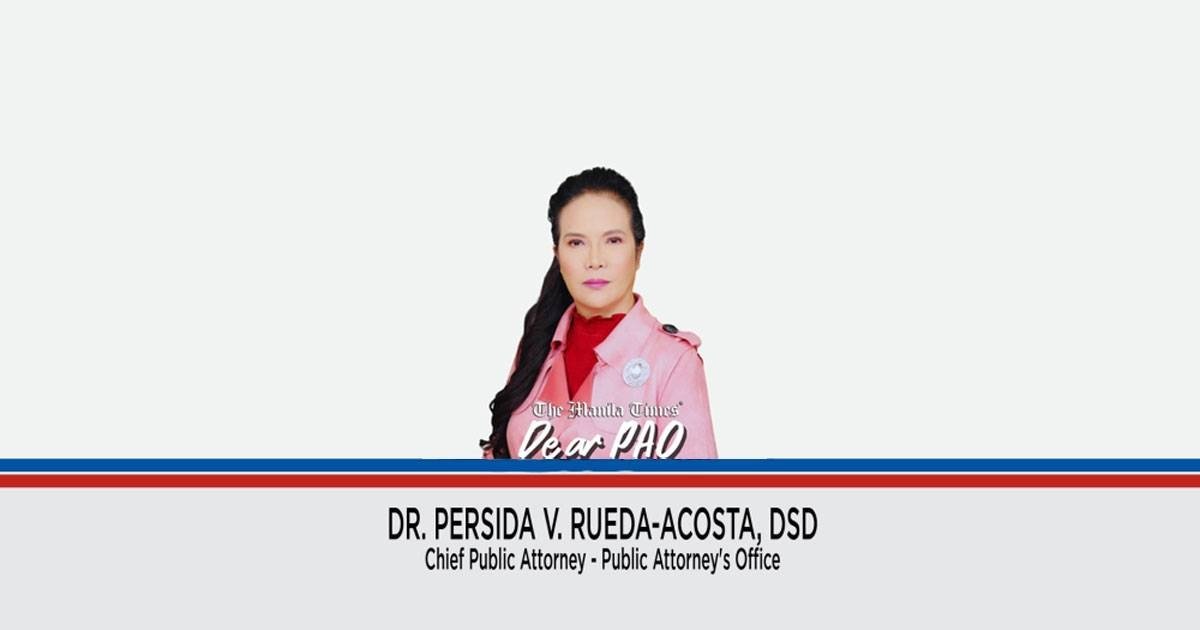Dear PAO,
Jun and Claire borrowed P3 million from me last year in order to finance the improvement of their house. Unfortunately, Jun met his untimely demise last month. I tried to collect the debt from Claire, but she gave me so many excuses. I am contemplating suing her to recover my money, but someone advised me that the proper legal remedy is to file my claim in the settlement of the estate of Jun. Why is it that I cannot collect personally from Claire after the death of her husband?
Shameer
Dear Shameer,

The property relation between Jun and Claire, whether it be an absolute community of property or a conjugal partnership of gains, was dissolved when Jun died. This is in accordance with Article 99 in relation to 126 of the Family Code of the Philippines, which provides that the absolute community or the conjugal partnership, as the case may be, terminates:
“(1) Upon the death of either spouse;
“(2) When there is a decree of legal separation;
“(3) When the marriage is annulled or declared void; or
“(4) In case of judicial separation of property during the marriage under Articles 134 to 138.”
Correlative thereto, the absolute community of property or the conjugal property is liable for the following debts (Article 94 / Article 121 of the Family Code of the Philippines):
“xxx (2) All debts and obligations contracted during the marriage by the designated administrator-spouse for the benefit of the community, or by both spouses, or by one spouse with the consent of the other;
“(3) Debts and obligations contracted by either spouse without the consent of the other to the extent that the family may have been benefited; xxx
“(7) Ante-nuptial debts of either spouse insofar as they have redounded to the benefit of the family;”
Generally, the collection of the debt contracted by the spouses must be made in the settlement of the estate of the deceased spouse or the liquidation of the community of properties or the conjugal properties, unless the spouses were jointly or severally liable for the contract of loan. The rationale for why the collection of the debt contracted by spouses cannot be brought against the surviving spouse was succinctly explained in the case of Alipio vs. Court of Appeals and Jaring, GR 134100, Sept. 29, 2000, where the Supreme Court, speaking through Associate Justice Vicente Mendoza, stated:
“As held in Calma v. Tañedo, after the death of either of the spouses, no complaint for the collection of indebtedness chargeable against the conjugal partnership can be brought against the surviving spouse. Instead, the claim must be made in the proceedings for the liquidation and settlement of the conjugal property. The reason for this is that upon the death of one spouse, the powers of administration of the surviving spouse cease and are passed to the administrator appointed by the court having jurisdiction over the settlement of estate proceedings. Indeed, the surviving spouse is not even a de facto administrator such that conveyances made by him of any property belonging to the partnership prior to the liquidation of the mass of conjugal partnership property is void.”
Applying the above-quoted decision in your situation, Claire did not automatically become a de facto administrator upon the death of her husband; thus, any conveyances made by her prior to the liquidation of the property belonging to the absolute community or conjugal property are void. Further, her power of administration as the surviving spouse ceased upon the death of her husband and passed upon the administrator of the latter’s estate. Thus, the appropriate legal remedy to collect a debt which redounded for the benefit of the family is to file a claim in the proceedings for the liquidation and settlement of the absolute community or conjugal property.
We hope that we were able to answer your queries. Please be reminded that this advice is based solely on the facts you have narrated and our appreciation of the same. Our opinion may vary when other facts are changed or elaborated on.
Editor’s note: Dear PAO is a daily column of the Public Attorney’s Office. Questions for Chief Acosta may be sent to [email protected]










